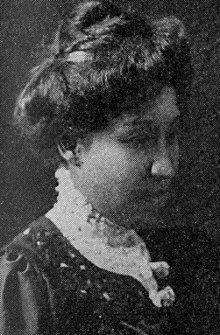Harriet Gibbs Marshall
Harriet Aletha Gibbs Marshall (born February 18, 1868 in Victoria , British Columbia , † February 25, 1941 in Washington, DC ) was an American pianist and pioneer for the training of African American musicians .
Life
Harriet Gibbs was born in Victoria, British Columbia, Canada to Mifflin Wistar Gibbs , the first African American judge in the United States , and Maria Ann Alexander Gibbs. In 1869 her family moved to Oberlin , Ohio . Harriet Gibbs began her musical education at the age of 9 at the conservatory in Oberlin, where she learned the piano , organ and singing . When she graduated in 1889, she was the first African American woman to earn a Bachelor of Music .
After graduating from Oberlin, Gibbs studied in Boston and Paris and returned to the United States in 1890. There she founded a school in Cane Springs ( Kentucky ) and a conservatory at Eckstein Norton University there. At the beginning of the 20th century, Harriet "Hattie" Gibbs was the supervisor of the African American public schools in school district X-XIII and was also the director of music in that district.
In 1903, she founded the Washington Conservatory of Music in Washington DC , which was later renamed the Washington Conservatory of Music and School of Expression , when additional courses in drama and language were added, supervised by Coralie Franklin Cook . Gibbs taught piano and organ there; other teachers there were Georgia Fraser Goins and Margaret Just . Gibbs' father, Judge MW Gibbs, donated a large house on T-Street to the Conservatory.
Harriet Gibbs married the lawyer Napoleon Bonaparte Marshall in 1906 . Together they worked for the conservatory, but in 1922 Napoleon Marshall was sent to Haiti as part of the US delegation from President Warren G. Harding . They lived there for six years. During this time, Harriet Gibbs Marshall founded the Jean Joseph Industrial School in Port-au-Prince and worked with Haitian social services.
After Napoleon Marshall died in 1933, Harriet Gibbs Marshall again took care of the Washington Conservatory of Music and School of Expression . In 1937 she founded the Negro Music Center as an extension of the conservatory . In addition to promoting creative work, this had the task of preserving traditional Afro-American music. Harriett Gibbs Marshall died on February 25, 1941 at the age of 73 in Washington, DC
Individual evidence
- ^ University of Kentucky Libraries: Notable Kentucky African Americans - Marshall, Harriet (Hattie) A. Gibbs. In: uky.edu. nkaa.uky.edu, accessed January 22, 2016 .
- ↑ Jessie Carney Smith: Notable Black American Women . VNR AG, 1996, ISBN 978-0-8103-9177-2 ( books.google.com ).
- ↑ a b c d Marshall, Harriet Gibbs (1868-1941) | The Black Past: Remembered and Reclaimed. In: blackpast.org. Retrieved January 22, 2016 .
- ^ Sondra Wieland Howe: Women Music Educators in the United States: A History . Scarecrow Press, 2013, ISBN 978-0-8108-8848-7 ( books.google.com ).
- ↑ Washington Conservatory of Music and School of Expression / Harriet Gibbs Marshall / Mary P. Burrill, African American Heritage Trail - www.culturaltourism.org. In: culturaltourismdc.org. Retrieved January 22, 2016 .
| personal data | |
|---|---|
| SURNAME | Marshall, Harriet Gibbs |
| ALTERNATIVE NAMES | Marshall, Harriet Aletha Gibbs (full name); Gibbs, Harriet; Gibbs, Hattie A. |
| BRIEF DESCRIPTION | American pianist |
| DATE OF BIRTH | February 18, 1868 |
| PLACE OF BIRTH | Victoria , British Columbia |
| DATE OF DEATH | February 25, 1941 |
| Place of death | Washington, DC |
